No Results Found
The page you requested could not be found. Try refining your search, or use the navigation above to locate the post.

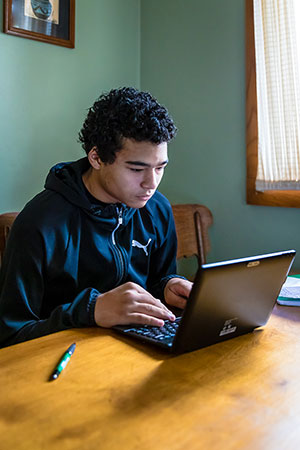 Special Package: An Unlikely Journey to Homeschooling
Special Package: An Unlikely Journey to Homeschooling
After playing for years on a very competitive baseball team, my son lost interest, complaining that his stomach hurt. He went from a kid who loved the game, to one who was repelled by it. The pain came and went sporadically. Then two years later at the start of 7th grade, it got worse. The trigger seemed to be increasing demands at school, from big presentations to stressful unit tests to just a lot of unfinished homework piling up.
Every morning was torture. I’d go to wake him up for school and I didn’t know whether he would fight his way awake or just pull the covers over his head and curl into a ball. I couldn’t understand why it was so impossible for him to fight through the pain. He would look at me with watery eyes and say he just couldn’t move.
My husband and I wanted to make sure he didn’t have some kind of underlying medical issue, so I took him to all sorts of specialists who examined him thoroughly with X-rays and blood tests. He was missing weeks of school at a time, but the tests revealed he didn’t have any physical ailments.
Finally, we broke down and had a full neurological exam, which cost us $1200—even with our health insurance. After the doctors reviewed surveys from us and his teachers, we finally got a diagnosis. Our son suffered from depression and anxiety disorder. Since both my husband and I have family members dealing with mental health issues, it wasn’t that out of the realm of possibility, I just hadn’t realized that this was how it could manifest itself.
Seeking Help & Support
We decided to enroll him into a Christian school anxiety and refusal program at a children’s hospital near our home so he could keep up his studies while getting therapy.
When we pulled up to the hospital for the first time, I saw a gigantic statue of Jesus with open arms — you know, like the Christ the Redeemer statue in Brazil. I felt like I was in the right place. After a few months of therapy, it seemed like we were making progress. However, he didn’t seem particularly eager to go back to his regular school.
In fact, this is when the idea of homeschooling first came up. My cousin homeschooled her kids in their elementary years and her oldest, who was accepted into one of the most competitive high schools in the Chicago area, had just been accepted to Stanford University. When my son asked to be homeschooled, too, I shot him down pretty quickly. That wasn’t even something I felt I could consider. Sure, I’ve been to college and I have a master’s degree, but in no way did I consider myself a teacher. People go to school for years to learn how to teach kids, I reasoned. I felt like I’d be short-changing his education.
Feeling alone and frustrated, I started talking to parents in my church about our challenges. It turns out that two moms I talked to regularly also had kids suffering from anxiety and depression. Both had put their kids in similar school refusal/anxiety programs. In fact, one had a son who was pretty close to my kid. They often attended youth activities together at church, but the mom never shared what she was going through until I opened up about our family’s struggles. The other mom served as the youth director for the church. I still appreciate our heart-to-heart conversations. I also began reaching out to church leaders for support and they gave us the gift of love, checking on us regularly and adding us to the prayer circle. The senior pastor even took an interest in strategizing on ways the church could support my son to help get him back on track. No one judged us. I so appreciated that.
By the end of 7th grade, we had gotten him back going to his regular public school, sort of. He still was missing a few days every week or so, but nothing like the year before where he missed nearly thirty days of school in one semester. I thought we were moving past a difficult phase. I was wrong. Eighth grade was almost as bad as seventh. He barely graduated and he wasn’t looking forward to high school.
Starting Public High School
Two months into his freshman year, the stomach ache absences started again. At this point, he was on medication to deal with his disorder and to keep the pains at bay. He was missing school every single week.
Ironically, I had started writing a story on how more Black parents were homeschooling, which had me interviewing friends, parents and other experts. My son saw me working on the article and raised the question again about homeschooling. After talking to people who were doing it with kids the same as age as my son, I started to think maybe it wasn’t so far-fetched. I was really surprised at the support and encouragement I received from people I didn’t even know. I learned that homeschooling is different for everyone. There is no right or wrong way as long as your child is learning and thriving. Still, we weren’t ready to completely cut the cord with our public high school.
The counselors suggested a schedule where he came to campus for two classes and then took four classes at home through our district’s online schooling program. Our son also would need to have an individualized education plan, but the testing to receive this plan could take three months to schedule. Also, with the program, he still would have to come to school for tests. Given tests are a trigger for him, that wasn’t going to work for us. This plan started out okay, but even with only two classes on campus, the absences due to illness slowly returned.
However, he was doing very well with the online program so a month into the plan, we took the leap of faith and enrolled him full-time into the online high school. The school social worker didn’t think this was the right decision because she felt like we were “giving in” to his mental health issues. His counselor said that most kids he knew who went this route weren’t successful. But we did it anyway.
We also were worried about our son’s learning environment. Our community still is reeling from being featured in America to Me, a docuseries that brought to light some of the grumblings I’ve heard from African American parents over the years who were concerned about their boys and the learning vibe in our school system for people of color. I wondered if, without preconceived notions about what he could achieve, homeschooling could help to build up his confidence and reduce his anxiety.
We didn’t pull him without a plan. I knew what our state required for homeschoolers so I wrote a letter to the high school with details of our plan to educate our son. The day after we withdrew him from the high school, we received a letter in the mail from the attendance office telling us he had missed too many days to get credit for his courses. That confirmed we made the right decision.
Starting Homeschooling
We enrolled him in a regionally accredited online private school called Acellus Academy, which is run by the International Academy of Science. Four months in, things are so much better. He has virtual teachers in videos and a regular curriculum, but I am still very involved in the process, monitoring how he’s doing and stepping in when needed. Even as I am pleased with the program so far, I do feel the need to supplement with additional lessons from Khan Academy, Teaching Textbooks, and YouTube. (There are A LOT of very good teachers explaining just about everything on YouTube.). I’ve also learned a lot from private parenting groups on Facebook. Additionally, I’m going to incorporate Black history, field trips, and some faith-based teachings. I was looking for an all-in-one solution that I could build on, but every family is different and there are so many ways to structure a homeschooling environment. Some states even offer free programs through the local public school districts.
As for my son, the stomach aches have stopped altogether. He is very good about doing his work and currently has six classes and a 3.8 GPA. It only takes him about three hours to do his work, which I’m learning is fairly typical for homeschoolers. When you strip out lunch, gym, study hall, questions from other kids in the classroom, and other activities unrelated to learning, you can gain a lot more time to do other types of learning. When he turns 16, he may even get a job during the school year.
Homeschooling Blog on UrbanFaith.com
By sharing my story, I hope other parents will feel encouraged to consider homeschooling. Whether you’re dealing with a child with medical or mental health issues, or you just want a unique and positive educational experience for your kids, it can be a satisfying decision to take control of your student’s academic success. I plan to write about the good and the bad of our family’s journey on UrbanFaith.com, providing as many resources as possible for working with kids of all ages. My family is a little late to the game with a high schooler now learning at home. I’m not sure how our story is going to pan out in the end, but right now I have faith that we made the right decision.
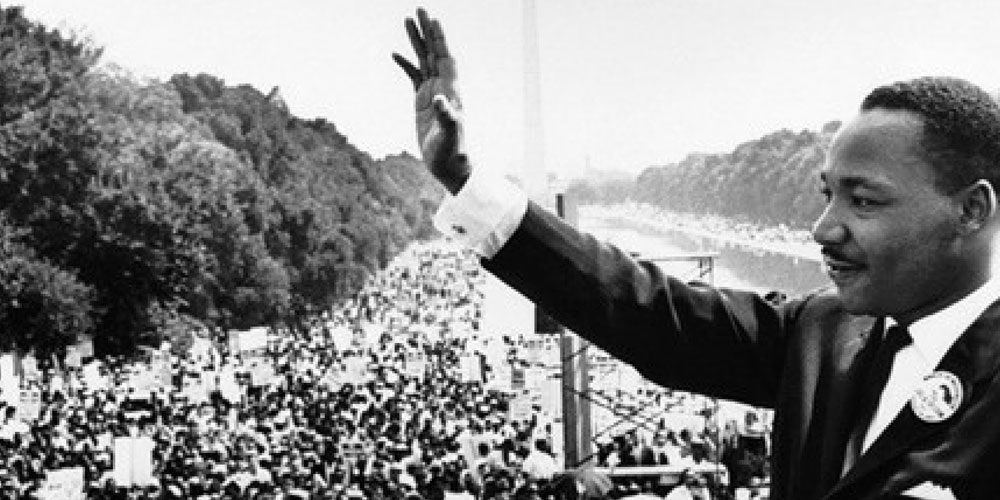

The page you requested could not be found. Try refining your search, or use the navigation above to locate the post.
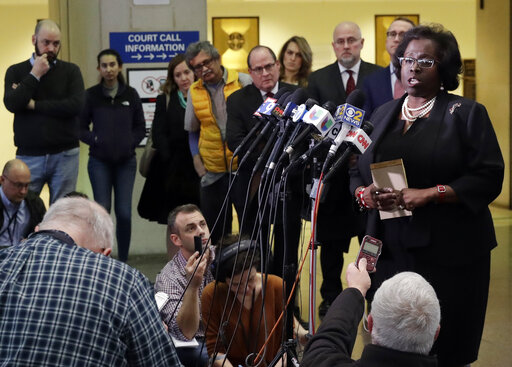
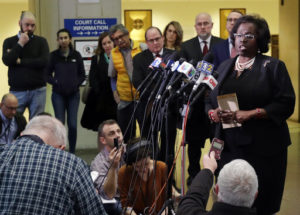
Special prosecutor Patricia Brown Holmes speaks to reporters at the courthouse Thursday, Jan. 17, 2019, in Chicago. Former Detective David March, ex-Officer Joseph Walsh and Officer Thomas Gaffney, three Chicago police officers accused accused of trying to cover up the fatal shooting of Laquan McDonald by officer Jason Van Dyke in October 2014, were acquitted by a judge Thursday. (AP Photo/Nam Y. Huh)
I’m in Chicago and we’re reeling over a judge who acquitted three Chicago police officers of trying to cover up the 2014 shooting of Laquan McDonald. It’s hard not to feel some kind of way (insert eye roll here), even though officer Jason Van Dyke was convicted last year of second-degree murder and aggravated battery in the case and sentenced to 81 months in prison. There were no cheers today. It’s almost like you could predict that someone had to take the fall, but the Chicago political machine that created an environment for this to happen churns on and it’s a win for the so-called police “Code of Silence.” Ironically, today I happened to be reading a lot of Bible verses on forgiveness. “Even if they sin against you seven times in a day and seven times come back to you saying ‘I repent,’ you must forgive them” (Luke 17:4).
I remember when the Charleston church shooting happened a few years ago. I was in awe at relatives of the victims who stood up and bravely told that heartless crazy man that they forgave him. It was a powerful message of forgiveness. So what about these cops? Do we just pray and let it go? Not so fast. God knows what we did, where we did it, and who we did it to. He still loves us and forgives us. But that doesn’t mean he has forgotten about it. He expects to see a change in us. Why shouldn’t we expect to see a change in police accountability in Chicago and across this country? I’m sure the Charleston relatives haven’t forgotten about Dlyann Roof and his Bible study attack either — they choose not to let their hearts be bitter (Hebrews 12:15). With that example, they changed the angry — and potentially destructive — conversation. And I’d like to believe their silent strength thawed a few bigoted cold hearts out there.
You could argue that a court acquitted the three police officers so there’s nothing to forgive. They are “not guilty” of this crime, so says a judge. Why doesn’t that make us feel better? Roll the video evidence, please. It doesn’t lie — even when law enforcement does.
So where does that leave us with these Chicago cops? We forgive, but continue to collectively fight the injustice that plagues our communities and demand change. Urban Faith has a list of faith-based social justice organizations that you can look into as a way to channel your frustration and maybe even fear about things happening around you that feel are out of your control. On that note, shout out to Dr Martin Luther King, Jr. Yeah, you may think he was a part of your mama’s Civil Rights Movement, but Dr. King and his bus-riding, arm-linked marching, boycotting activists clearly understood channeling those feelings of anger and frustration into positive actionable change.
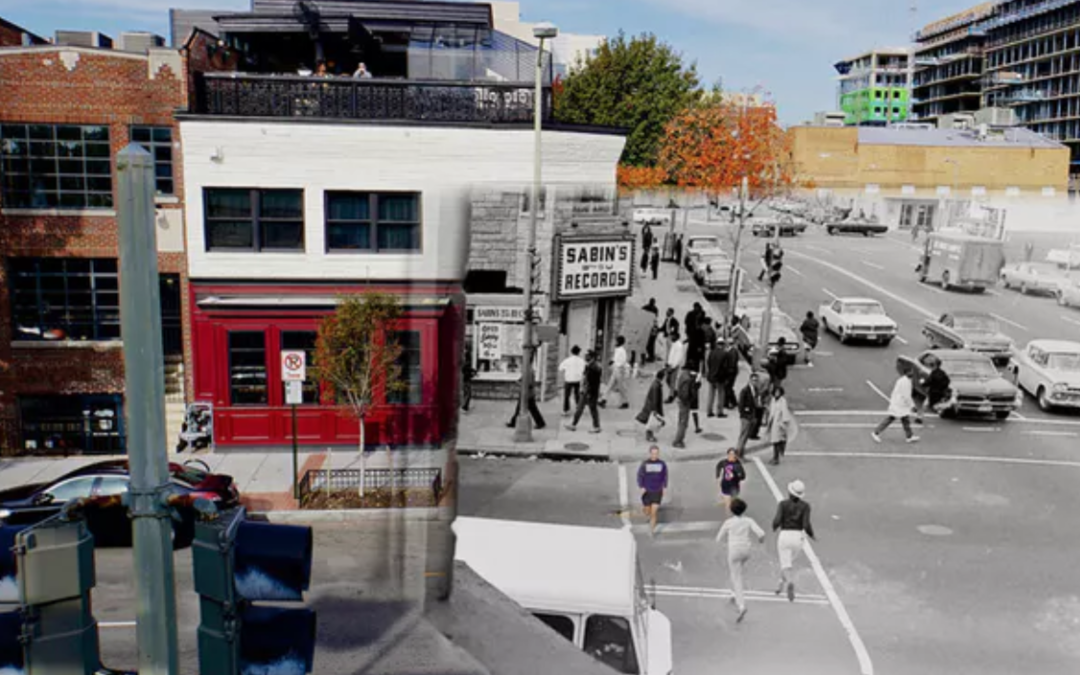
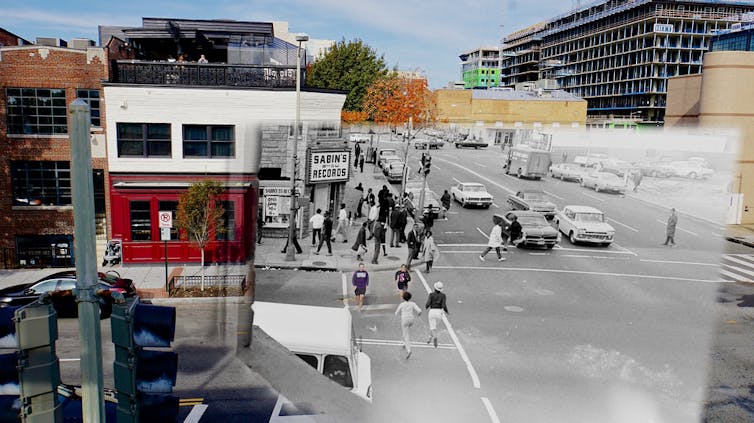
Don’t Miss Our Celebrating Dr. Martin Luther King, Jr. Special Package!
On Apr. 4, 1968, Dr. Martin Luther King Jr. was assassinated in Memphis, Tennessee, while assisting striking sanitation workers.
Back then, a half century ago, the wholesale racial integration required by the 1964 Civil Rights Act was just beginning to chip away at discrimination in education, jobs and public facilities. Black voters had only obtained legal protections two years earlier, and the 1968 Fair Housing Act was about to become law.
African-Americans were only beginning to move into neighborhoods, colleges and careers once reserved for whites only.
I’m too young to remember those days. But hearing my parents talk about the late 1960s, it sounds in some ways like another world. Numerous African-Americans now hold positions of power, from mayor to governor to corporate chief executive – and, yes, once upon a time, president. The U.S. is a very different place than it was in 1968.
Or is it? As a scholar of minority politics, I know that while some things have improved markedly for black Americans in the past 50 years, today we are still fighting many of the same battles as Dr. King did in his day.
The 1960s were tumultuous years indeed. During the long, hot summers from 1965 to 1968, American cities saw approximately 150 race riots and other uprisings. The protests were a sign of profound citizen anger about a nation that was, according to the National Advisory Commission on Civil Disorders, “moving toward two societies, one black, one white — separate and unequal.”
Economically, that was certainly true. In 1968, just 10 percent of whites lived below the poverty level, while nearly 34 percent of African-Americans did. Likewise, just 2.6 percent of white job seekers were unemployed, compared to 6.7 percent of black job seekers.
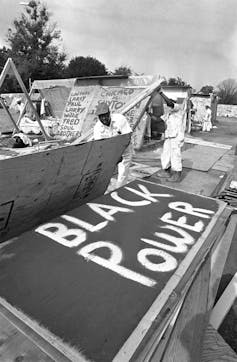
A year before his death, Dr. King and others began organizing a Poor People’s Campaign to “dramatize the plight of America’s poor of all races and make very clear that they are sick and tired of waiting for a better life.”
On May 28, 1968, one month after King’s assassination, the mass anti-poverty march took place. Individuals from across the nation erected a tent city on the National Mall, in Washington, calling it Resurrection City. The aim was to bring attention to the problems associated with poverty.
Ralph Abernathy, an African-American minister, led the way in his fallen friend’s place.
“We come with an appeal to open the doors of America to the almost 50 million Americans who have not been given a fair share of America’s wealth and opportunity,” Abernathy said, “and we will stay until we get it.”
So, how far have black people progressed since 1968? Have we gotten our fair share yet? Those questions have been on my mind a lot this month.
In some ways, we’ve barely budged as a people. Poverty is still too common in the U.S. In 1968, 25 million Americans — roughly 13 percent of the population — lived below poverty level. In 2016, 43.1 million – or more than 12.7 percent – do.
Today’s black poverty rate of 22 percent is almost three times that of whites. Compared to the 1968 rate of 32 percent, there’s not been a huge improvement.
Financial security, too, still differs dramatically by race. Black households earn $57.30 for every $100 in income earned by white families. And for every $100 in white family wealth, black families hold just $5.04.
Another troubling aspect about black social progress – or should I say the lack thereof – is how many black families are headed by single women. In the 1960s, unmarried women were the main breadwinners for 20 percent of households. In recent years, the percentage has risen as high as 72 percent.
This is important, but not because of some outmoded sexist ideal of the family. In the U.S., as across the Americas, there’s a powerful connection between poverty and female-headed households.
Black Americans today are also more dependent on government aid than they were in 1968. Currently, almost 40 percent of African-Americans are poor enough to qualify for welfare, housing assistance and other government programs that offer modest support to families living under the poverty line.
That’s higher than any other U.S. racial group. Just 21 percent of Latinos, 18 percent Asian-Americans and 17 percent of whites are on welfare.
There are, of course, positive trends. Today, far more African-Americans graduate from college – 38 percent – than they did 50 years ago.
Our incomes are also way up. Black adults experienced a more significant income increase from 1980 to 2016 – from $28,667 to $39,490 – than any other U.S. demographic group. This, in part, is why there’s now a significant black middle class.
Legally, African-Americans may live in any community they want – and from Beverly Hills to the Upper East Side, they can and do.
But why aren’t those gains deeper and more widespread?
Some prominent thinkers – including the award-winning writer Ta-Nehisi Coates and “The New Jim Crow” author Michelle Alexander – put the onus on institutional racism. Coates argues, among other things, that racism has so held back African-Americans throughout history that we deserve reparations, resurfacing a claim with a long history in black activism.
Alexander, for her part, has famously said that racial profiling and the mass incarceration of African-Americans are just modern-day forms of the legal, institutionalized racism that once ruled across the American South.
More conservative thinkers may hold black people solely accountable for their problems. Secretary of Housing and Urban Development Ben Carson is in this “personal responsibility” camp, along with public intellectuals like Thomas Sowell and Larry Elder.
Depending on who you ask, then, black people aren’t much better off than in 1968 because either there’s not enough government help or there’s way too much.
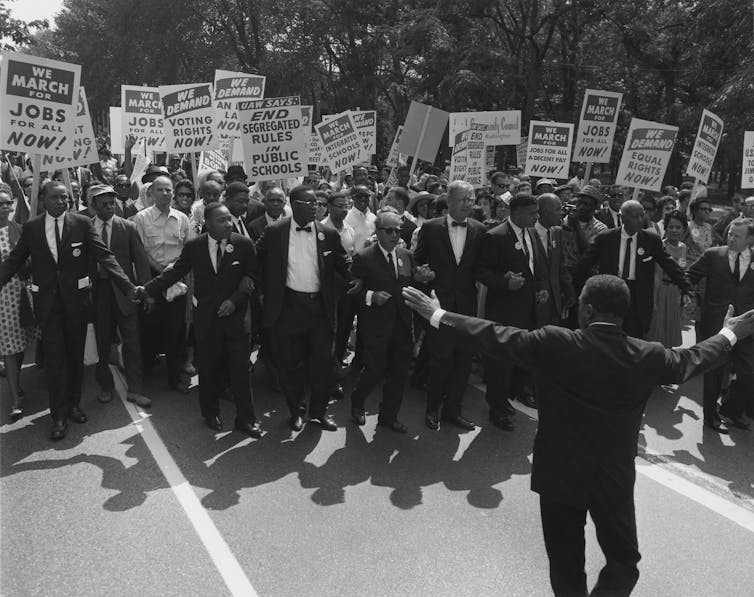
I don’t have to wonder what Dr. King would recommend. He believed in institutional racism.
In 1968, King and the Southern Christian Leadership Council sought to tackle inequality with the Economic Bill of Rights. This was not a legislative proposal, per se, but a moral vision of a just America where all citizens had educational opportunities, a home, “access to land,” “a meaningful job at a living wage” and “a secure and adequate income.”
To achieve that, King wrote, the U.S. government should create an initiative to “abolish unemployment,” by developing incentives to increase the number of jobs for black Americans. He also recommended “another program to supplement the income of those whose earnings are below the poverty level.”
Those ideas were revolutionary in 1968. Today, they seem prescient. King’s notion that all citizens need a living wage portends the universal basic income concept now gaining traction worldwide.
King’s rhetoric and ideology are also obvious influences on Sen. Bernie Sanders, who in the 2016 presidential primaries advocated equality for all people, economic incentives for working families, improved schools, greater access to higher education and for anti-poverty initiatives.
Progress has been made. Just not as much as many of us would like. To put it in Dr. King’s words, “Lord, we ain’t what we oughta be. We ain’t what we want to be. We ain’t what we gonna be. But, thank God, we ain’t what we was.”![]()
Sharon Austin, Professor of Political Science and Director of the African American Studies Program, University of Florida
This article is republished from The Conversation under a Creative Commons license. Read the original article.
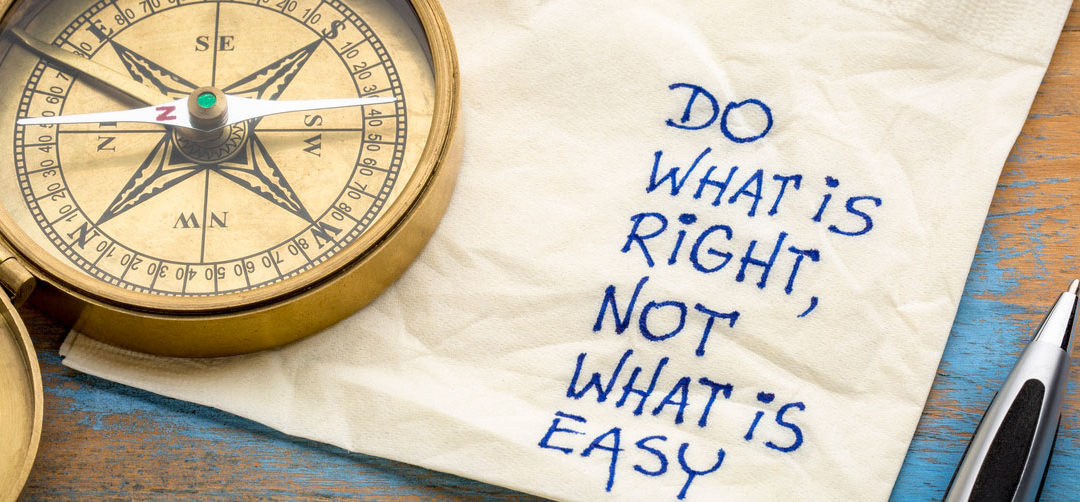

Emerging from a season that primarily represents joy, unity and faith, fear and distrust lead the way. Whether you are a part of the faith community or not, you witnessed a 2019 new year governed by a democracy that was less than fully functional. In fact, it rapidly progressed into a historic government shutdown. Call it what you want, but many people are anxious about all types of potentially damaging effects of some degree of personal and publicly traded financial free fall. At the core of the matter, can we consider that perhaps the lack of ethics was a major culprit in this dilemma? If we all authentically ponder this idea, we may find some eye-opening premises.
Years ago during my college days, my roommate and I would joke about advice that her parent would often tell her when she was growing up. Almost always when she responded with her version of various explanations to her parents’ inquiries, they were met with the response from the parent “now lie to me the truth!” Of course, it was a laughing matter then, but now it is a demand within every part of our culture. One fact that will always remain, regardless of what Christian apologists or universal pessimists choose to teach the masses, truth is the cornerstone of ethics. The quality of being honest will always win. In the context of biblical teaching, 1 John 3:18 encourages all Christians to “let us not love with words or speech but with actions and in truth.” But, who’s perfect?
For the first time in history, 2019 has presented us with the longest federal government shutdown ever. Mired by future uncertainty, lack of confidence and blind allegiances are rampant and send alarming signals projecting harm on others and fail to be in the interest of anyone but a few. There are more questions than answers and even less tolerance to resolve the obvious ills that plague all of us. If we struggle to depend on our nation of laws, then where is the teaching and intervention from the church? Have we all tossed our consciousness out the window?
The Wall, Conspiracies, and Indictments
There are multiple contexts given these are subjects that intertwine ethics and faith. However, it can be assumed that some of these most recent circumstances are not all negative or intentional. Perhaps there is a spiritual message that reminds us of lessons from the ministry of Christ. Christ and his disciples worked to teach the meaning and the importance of the necessity to respond to the concept of ethics to the nations. Their message essentially resounded that love and care for all people was good. Selfishness and lack of respect, not just the love of money, is equally the root of all evil. However in these times, self-preservation has become a common mantra and the Apostle Paul’s brutally honest confession in Romans 7:15-20 (NLT) simply has been lost in the sauce. Paul honestly explained that 15 “I don’t really understand myself, for I want to do what is right, but I don’t do it. Instead, I do what I hate. 16 But if I know that what I am doing is wrong, this shows that I agree that the law is good. 17 So I am not the one doing wrong; it is sin living in me that does it. 18 And I know that nothing good lives in me, that is, in my sinful nature. I want to do what is right, but I can’t. 19 I want to do what is good, but I don’t. I don’t want to do what is wrong, but I do it anyway.” Does this sound familiar as reflected in our current state of world affairs and personal choices? Can we at least give Paul credit for acknowledging his truth to others? His statement was not an excuse to continue his inappropriate behavior, but a truth of his own self-awareness that as human beings, our faith can be a saving grace that begins to address the issues that contribute to corruption in our society and to the human spirit.
The good news is that the cornerstone of Christianity is still built on righteousness, not perfection. Although our government and its leadership have an obligation to be lawful, our community of faith has a job to also be accountable to teach more truth and empowerment. There are biblical laws that are universal. The lack integrity can bring on harsh consequences that spare no one. For example, we can begin with the Ten Commandments. They are regarded to some as ancient fairytales that have less relevance in our lives, yet disobedience of either of them can literally wreak havoc on our well-being as well as our quality of life or even our very existence. Biblical principles must be taught purposely for both salvation and survival and not in vain.
Ethics begin and end when there is a conscientious shift that keeps us in tune with truth that transforms us to intentionally think more in-depth about our ethical life choices or outcomes. The old must make an honest effort to teach the young. The self-absorbed must realize that they can make a difference to the less fortunate. Leadership is far more effective when leaders deliberately learn strategies without an ulterior motive that connotes deception or intent to hide true motivation. While there may have been many reasons for an action, the intent should reflect the true thing that is trying to be accomplished. No matter how insignificant an issue may be, a little white lie is still deception. More than ever before, there is a critical need for leaders of all levels to learn and continue to re-learn contemporary and more influential leadership skills that help those who follow them better understand that hopelessness is a choice and not the norm. As one of the wealthiest nations on earth, we have the resources, ability, and heart to be the ethical beacon of light that practices the type of equality that pays employees on time, feeds the hungry, provides a fair system of education for all, helps those who are giving their all to escape persecution, and most of all, as the Bible instructs “obey the laws of the land.” This is emphasized in Romans 2:13 — 13 ”For merely listening to the law doesn’t make us right with God. It is obeying the law that makes us right in his sight.” This logic should make sense, especially to those who follow Christ’s teachings.
Before we as a nation pay to build more walls for borders, let more individuals within the community of faith tear down unnecessary walls to embrace those who seek refuge. This is also embodied within the ministry of Christ. Keep in mind that all efforts to conspire against anyone or anything is unethical. Nevertheless, let the church continue to maintain its major role to inspire hope and spiritual awakening. Believers in Christ, let’s not allow ourselves to become desensitized to anything that resembles less than the truth. It carves a path that may lead to eventual indictments on the message of love we attempt to send throughout the world. For indeed, it is our privilege to be vigilant in recognizing the opposite of what is right and ethical to further strengthen faith in the face of fear. The freedom of truth is the most ethical contribution to mankind. Jesus was very clear about this in John 8:31-32, 31 Those that had believed him, Jesus said, “If you hold to my teaching, you are really my disciples. 32 Then you will know the truth, and the truth will set you free.”